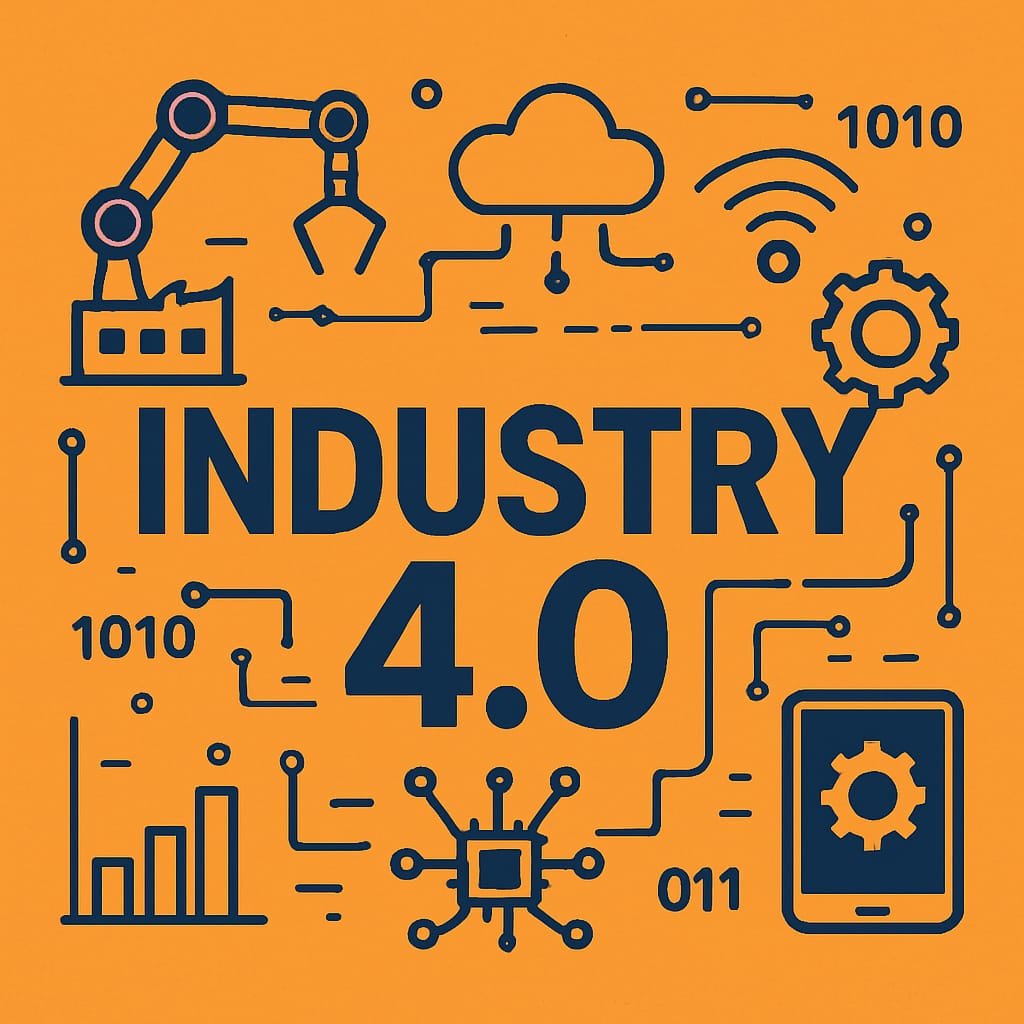
Aradhana Bhattacharya
Industry 4.0: The Fourth Industrial Revolution
Industry 4.0, often called the Fourth Industrial Revolution, represents a fundamental transformation in how industries operate, characterized by the integration of advanced digital technologies into manufacturing and industrial processes. It builds upon previous industrial revolutions (steam power, electricity, and electronics/IT) by creating “smart factories” were machines, systems, and humans are interconnected and communicate with each other in real-time.
Key Technologies Driving Industry 4.0:
Internet of Things (IoT) / Industrial Internet of Things (IIoT):
Networks of physical devices, machines, vehicles, and other items embedded with sensors, software, and other technologies that connect and exchange data over the internet.
Artificial Intelligence (AI) & Machine Learning (ML):
Used for data analysis, pattern recognition, predictive maintenance, quality control, automation of complex tasks, and optimizing production processes.
Big Data & Analytics:
The ability to collect, process, and analyze vast amounts of data from various sources to gain actionable insights.
Cloud Computing:
Provides the scalable infrastructure for storing and processing the enormous amounts of data generated, enabling accessibility and collaboration across different locations and systems.
Cybersecurity:
Essential for protecting the interconnected systems and sensitive data from cyber threats.
Digital Twins:
Virtual replicas of physical assets, processes, or systems that can be used for simulation, analysis, and optimization before implementing changes in the real world.

How is CAG College aligned with it:
CAG College is at the forefront of educational transformation, actively aligning its curriculum and infrastructure with the principles of Industry 4.0—the Fourth Industrial Revolution. This revolution is defined by the seamless integration of the digital, physical, and biological realms, driven by cutting-edge technologies such as Artificial Intelligence (AI), Internet of Things (IoT), big data analytics, robotics, cloud computing, and cybersecurity.
As industries evolve with automation and intelligent systems, CAG College is strategically upgrading its academic framework to prepare students for the future of work. The college offers hands-on training, workshops, and real-world projects that immerse students in next-generation technologies. These efforts are designed to bridge the gap between traditional education and the dynamic needs of Industry 4.0-enabled workplaces.

Here’s how CAG College is aligning with Industry 4.0:
Curriculum Transformation:
Integration of Core Technologies:
The college is revamping its curricula to include specialized courses in AI, machine learning, data science, blockchain, cybersecurity, IoT etc.
Focus on Digital and Computational Thinking:
Emphasizing digital competencies, computational thinking, and data-driven decision-making to prepare students for a digitally integrated world.
Shift to “Innovation” and “Experimentation”:
Moving away from a one-size-fits-all approach, the college is facilitating “innovation” and “experimentation” through project-based learning, problem-solving scenarios, and hands-on experiences.
Technical Skills:
Providing training in advanced technological skills like programming for automation, data analysis, network management, and understanding smart sensors.
Soft Skills:
Cultivating essential soft skills, which are increasingly vital in automated
environments, including:
- Complex problem-solving and critical thinking
- Creativity and innovation
- Adaptability and flexibility
- Collaboration and communication
- Emotional intelligence
Personalized Learning:
The college is focusing on AI and data analytics to offer personalized learning experiences, adaptive instruction, and real-time feedback tailored to individual student needs and learning styles.
Active Learning and Mentorship:
Shifting the faculty’s role from traditional lecturing to coaching and mentoring, encouraging self-discovery and active participation through group work, simulations, games, and real-world problem-solving.
Technology Integration in Learning:
Utilizing digital tools and resources like online learning platforms, virtual and augmented reality (VR/AR) for immersive simulations, and smart campus initiatives with IoT-enhanced learning environments.
Industry Collaboration and Partnerships:
Internships and Live Projects:
Establishing strong ties with industries to offer students internships, live projects, and mentorships, providing them with practical experience and exposure to real-world challenges.
Joint Research and Development:
Collaborating with industry partners, government agencies, and international organizations on research and development initiatives, fostering innovation and technology transfer.
Expert Talks and Lecture Series:
Inviting industry experts for guest lectures and workshops to bridge the gap between academia and current industry practices.
Infrastructure Development:
The college is actively investing in advanced laboratories, research facilities, high-speed internet, and digital infrastructure to support the integration of Industry 4.0 technologies into the learning environment.
The CAG College is facilitating the students with its incredible infrastructure that supports
learning, growth, and daily lives. From the well-maintained classrooms and state-of-the-art
laboratories to the inviting common spaces, robust libraries, and reliable technological
backbone, every element plays a crucial role in shaping the educational experience. The
college is not only preparing students for the current demands of Industry 4.0 but also
equipping them to be future-ready, innovative, and adaptable in a world shaped by
continuous technological advancements.
